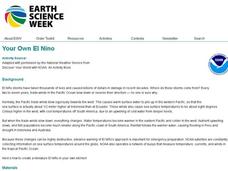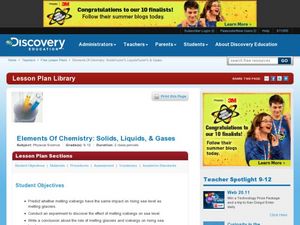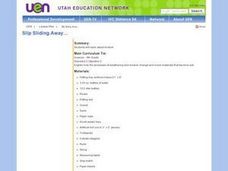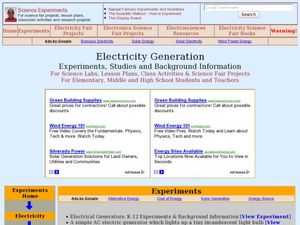Curated OER
Floods: Rising Waters and You
Students will examine how floods work and why they can cause so much damage and destruction. They use a stream table to observe the processes that lead to flooding and the effects of floods on human-made structures. Includes a guide to...
Wild BC
The Greenhouse Effect: Warming the Earth Experiment
First in a two-part lesson on the greenhouse effect, this lesson involves a classroom demonstration of the phenomenon, and a lab group experiment with color and absorption. Although there are easier ways to demonstrate the greenhouse...
Curated OER
Overflowing the Banks
Students discover how levees hold a river within its banks and cause height of river to rise & back up into less well-protected tributaries that feed into the river, by constructing model of riverbanks, creating a flood, &...
Curated OER
Floodplain Modeling
Students simulate the impact of fluctuating river volumes on structures and landforms. They experiment with table top-sized riverbed models and water. Students consider how human design can help mitigate the effects of a flood.
Curated OER
Flood!
Students examine different types of soil have different capacities for retaining rainwater. In this science lesson, students determine that if the soil in an area will not hold enough rainwater there may be a flood. Students experiment...
Curated OER
Environment: Rivers of Destiny
Students investigate the results of human intervention with the Mekong. Mississippi, and Amazon rivers. After watching a video about the status of the three rivers, they complete experiments demonstrating the effects of erosion and...
Curated OER
Weathering Rocks
Here is a geology lesson that is sure to get your charges excited. It's all about the process of weathering of rocks. Learners study natural events that can cause rocks to break apart. Some of these events are: ice wedging, plant...
Big Kid Science
Create a Milk Carton Camera to Observe the Eclipse!
Step aside, fancy glasses... it's time to create a solar eclipse viewing camera of your own using nothing more than a milk carton.
Curated OER
Mini-Landslide
Students explore how different materials (sand, gravel, lava rock) with different water contents on different slopes result in landslides of different severity. They measure the severity by how far the landslide debris extends into model...
Curated OER
Ecology
Students explore, experience and experiment identifying the human impact on the environment of vegetative differences within the same biome. They assess what causes deserts, rain forests, savannahs, tundras and saguaros and how these...
Curated OER
Erosion in Different Soils [Erosion Races]
Fourth graders review how erosion can happen by wind, water, and gravity which they studied in previous lesson. They attempt to discover if all soils erode at the same rate. In small groups, 4th graders experiment with three different...
Curated OER
Now You See Me, Now You Don't
Bioluminescence fascinates most upper elementary scientists. Display images of different glowing deep-sea organisms and discuss their environment. Young biologists then experiment with images and different colors of filtered light. In...
Curated OER
Storm That Drowned a City
Students use a map to locate New Orleans and watch a video on the destruction of Hurricane Katrina. As a class, they watch a demonstration on how a wetland can reduce the impact of a hurricane. In groups, they perform their own...
Curated OER
Your Own El Nino
Students conduct an experiment. In this El Nino lesson, students learn where El Nino storms come from, what they consist of and what effects they have. Students also complete an experiment where they create a miniature El Nino.
Curated OER
Elements of Chemistry: Solids, Liquids and Gases
Students predict if icebergs melting has an effect on the sea level rising. In this global warming lesson students complete an experiment to see the effects of melting icebergs and write a conclusion on their data collected.
Curated OER
Rising Sea Levels: UK and Bangladesh
Students explore the possible effects of global warming. In this geography/global warming lesson, students identify regions using an atlas and complete a global warming worksheet. Students perform an experiment in which they simulate...
Curated OER
Watch Out for Landslides
Students conduct an experiment. In this landslides lesson, students learn about landslides and discuss how they could minimize the risk of landslides. Students complete an experiment to see if changing the slope of the land...
Curated OER
Science:Effects of Weathering
Seventh graders take an outdoor observation walk around the campus and take soil samples. Working in groups , they conduct experiments with rocks and soil that demonstrate the effects of different types of erosion.
Curated OER
Erosion: Slip Sliding Away
Fourth graders investigate the causes of erosion. Through several demonstrations including one using sugar cubes and warm water, they observe the effects of erosion. In groups, 4th graders conduct similar experiments and record their...
Curated OER
Model Volcanoes
Students discover what causes earthquakes, volcanoes and floods. Using this information, they discuss how these natural disasters change the surface of the Earth. In groups, they make models, draw pictures and make them erupt.
Curated OER
Electricity Generation
Students study the history of electricity and the different ways we generate electricity. In this electricity lesson students complete several experiments on generating power.
Curated OER
Who's Coming to Lunch: A Study of Mold Growth
Students participate in an experiment to determine where fungi and molds are formed, and create graphs documenting fungal growth.
Curated OER
HOW FAST DO SEDIMENT GRAINS OF DIFFERENT SIZES SETTLE?
Students conduct an experiment using sand, a jar, and a paper clip to analyze the effects of different kinds of sand vis a vis its sediment. They graph their findings and analyze for factors of size, shape, and density.
Curated OER
A Priceless Collection
Pupils read about and discuss life of Russian geneticist Nikolai Vavilov, define terms related to field of genetics, complete worksheets, conduct seed experiments, observe and record results, and locate seed banks on world map or globe.












![Erosion in Different Soils [Erosion Races] Lesson Plan Erosion in Different Soils [Erosion Races] Lesson Plan](http://content.lessonplanet.com/resources/thumbnails/140405/large/cgrmlwnvbnzlcnqymdezmdmyos01nde3lxfmmzy0dc5qcgc.jpg?1414240121)












